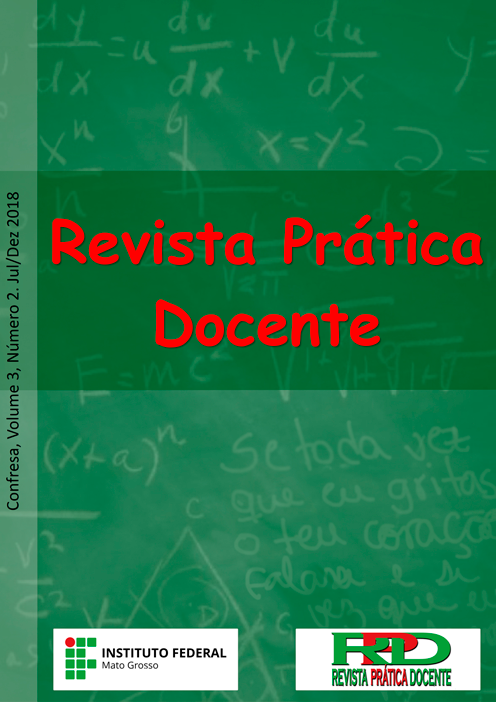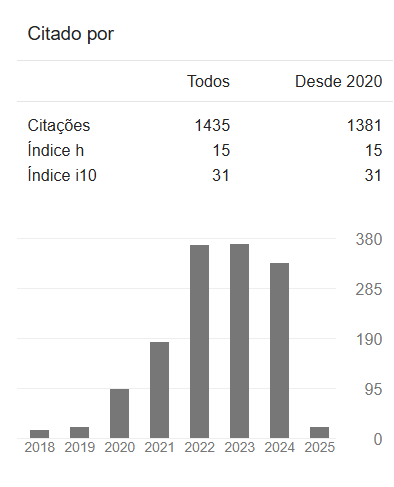TEACHING AND TECHNOLOGY:POSSIBLE DIALOGUES BETWEEN THE COMPULSORY CURRICULAR TRAINEESHIP AND THES
DOI:
10.23926/RPD.2526-2149.2018.v3.n2.p720-739.id135Keywords:
Education, Teacher Education, Distance EducationAbstract
This work connects the results of the research that was carried out in the Project “Teacher education in undergraduate courses distance learning: of learning with technology while teaching with technology", linked to the line of research "Teaching of Languages and their Technologies”, which aims to investigate the impact that new technologies have on students formation, more specifically in Mandatory Curricular Practicum for Letters students in Connected Classroom Teaching. For this purpose, a qualitative research was carried out with students who were in the last semesters of the Letters Course in a private university in the state of Minas Gerais. A questionnaire was used as an instrument for the research. The theoretical references followed an epistemological basis of multiliteracy as a social practice and the data showed that students are conscious about the necessity of using technology at schools. Nevertheless, their enunciation also indicated that they still do not know how to put this theory in practice.
Downloads
Metrics
References
BAKHTIN, Mikhail M. Estética da criação verbal. 5. ed. São Paulo: WMF Martins Fontes, 2010.
CARMO, Josué G. Botura. O letramento digital e a inclusão social. 2003. Disponível em: <https://sites.google.com/site/estudosdeletramento/letramento-digital-1>. Acesso em: 25 out. 2017.
CRUZ, Vilma Aparecida Gimenes. Metodologia da pesquisa científica. São Paulo: Pearson Prentice Hall, 2009.
FREGONEZE,Gisleine Bartolomei; TRIGUEIRO, Rodrigo de Menezes; RICIERI, Marilucia; BOTELHO, Joacy Machado. Metodologia científica. Londrina: Editora e Distribuidora Educacional, 2014.
LÉVY, Pierre. O que é virtual?. Tradução de Paulo Neves. São Paulo: Ed. 34, 1996.
MARTÍN, Sonia Casillas; GONZÁLEZ, Marcos Cabezas; ARRIBA, Jorge Martín de. Knowledge Management: Experiences of Collaborative Work Using ICT with Students. Digital Educaction Review, v. 30, p. 184-206, 2016. Disponível em: <http://revistes.ub.edu/index.php/der/article/view/15075>. Acesso em: 05 mar. 2018.
MERCADO, Luís Paulo Leopoldo. Formação docente e novas tecnologias. In: Luiz Paulo Leopolto (Org.). Novas tecnologias na educação: reflexões sobre a prática. Maceió: Edufal, 2002.
MORAN, José Manuel; MASETTO, Marcos T.; BEHRENS, Marilda Aparecida. Novas tecnologias e mediação pedagógica. Campinas: Papirus, 2000.
NANTES, Eliza. Língua portuguesa II: leitura e produção de texto. São Paulo: Pearson Prentice Hall, 2009.
OLIVEIRA. Fátima Bayma de. Tecnologia da Informação e Comunicação: A busca de uma visão ampla e estruturada. São Paulo: Pearson, 2006.
RAMPAZZO, S. R. R.; FRANÇA, C. S.; BADALOTTI, G. M.; FAVERE, J. Educação e tecnologias. Londrina: Editora e Distribuidora Educacional, 2014.
ROJO, R. H. R. Linguagens Códigos e suas tecnologias. In: BRASIL. Ministério da Educação. Secretaria da Educação Básica. Departamento de Políticas do Ensino Médio. Orientações curriculares do ensino médio. Brasília, 2004.
ROJO, Roxane; MOURA, Eduardo. Multiletramentos na escola. São Paulo: Parábola, 2012.
SANTAELLA, L. Linguagens líquidas na era da mobilidade. São Paulo: Paulus, 2007.
SILVA, Solimar Patriota. Letramento digital e formação de professores na era da web 2.0: o que, como e por que ensinar?. Hipertextus Revista Digital, n. 8, jun. 2012. Disponível em: <http://doczz.com.br/doc/647405/letramento-digital-e-forma%C3%A7%C3%A3o-de-professores-na-era-da-we.>..Acesso em: 15 set. 2017.
SOARES, M. B. Novas Práticas de Leitura e Escrita: letramento na cibercultura. Educ. Soc., Campinas, v. 23, n. 81, p. 143-160, dez. 2002. Disponível em: <http://www.scielo.br/pdf/es/v23n81/13935.pdf>. Acesso em: 30 set. 2017. DOI: https://doi.org/10.1590/S0101-73302002008100008
SOARES, M. B. Letramento: um tema em três gêneros. Belo Horizonte: Autêntica, 2004.
TFOUNI, L.V. Letramento e alfabetização. São Paulo: Cortez, 1995.
XAVIER, Antônio Carlos dos Santos. Leitura, texto e hipertexto. In: MARCUSCHI, L.A. (Orgs.). Hipertexto e gêneros digitais: novas formas de construção de sentido. Rio de Janeiro: Lucerna, 2004.
XAVIER, Antônio Carlos dos Santos. Letramento digital e ensino. Núcleo de Estudos de Hipertexto e Tecnologia Educacional. 2015. Disponível em: <http://www.nehte.com.br/artigos/Letramento-Digital-Xavier.pdf>. Acesso em: 19 dez. 2017.
Downloads
Published
How to Cite
Issue
Section
License
Copyright (c) 2023 A Revista Prática Docente tem o direito de primeira publicação

This work is licensed under a Creative Commons Attribution-NonCommercial 4.0 International License.
Authors who publish in this journal agree to the following terms:
- Authors retain the copyright and grant the journal the right of first publication, with the paper simultaneously licensed under the Licença Creative Commons Attribution allows the sharing of the work with acknowledgment of authorship and initial publication in this journal.
- Authors are authorized to take additional contracts separately, for non-exclusive distribution of the version of the work published in this journal (e.g. publish in institutional repository or as a book chapter), with acknowledgment of authorship and initial publication in this journal.











